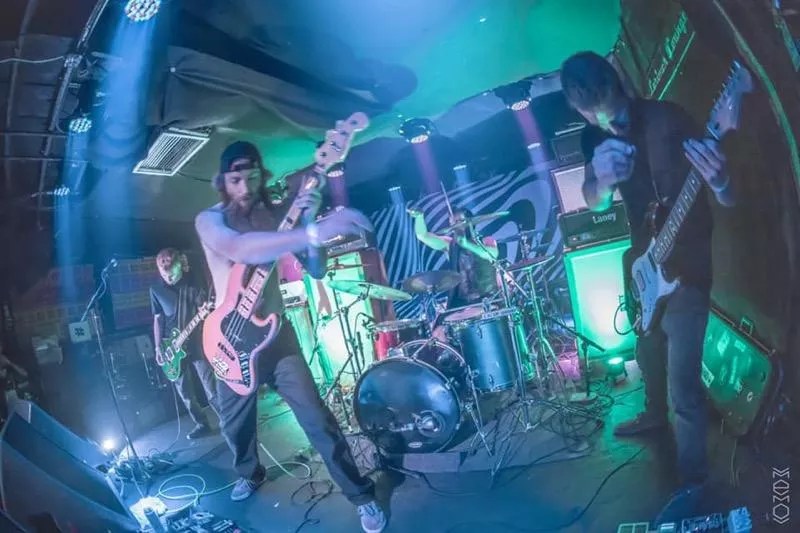
Memorandum Media

Audio By Carbonatix
Minutes before a set during the 2018 Underground Music Showcase, smoke filled the inside of the hi-dive. A green light illuminated the fog, and a metal band took the stage, delivering fifty minutes of pure catharsis. Throbbing bass drones and soaring guitars melted into the subterranean rhythms of the drums, causing ears to ring and hearts to pound. The members of Green Druid were high off the release of their debut full-length, Ashen Blood, bringing drunken fans along for the ride.
Now, more than two years and a pandemic later, the quartet will release At the Maw of Ruin on December 4 on Earache, one of the nation’s most influential metal labels.
The album is six tracks of pure stoner metal. Unnerving rhythms crumble beneath simmering riffs always threatening to boil over. The songs were largely recorded live, allowing for an organic chemistry among the bandmates to emerge. With prophetic lyrics about isolation and paranoia written before the pandemic, the album couldn’t be more timely, dropping as the virus ravages the country.
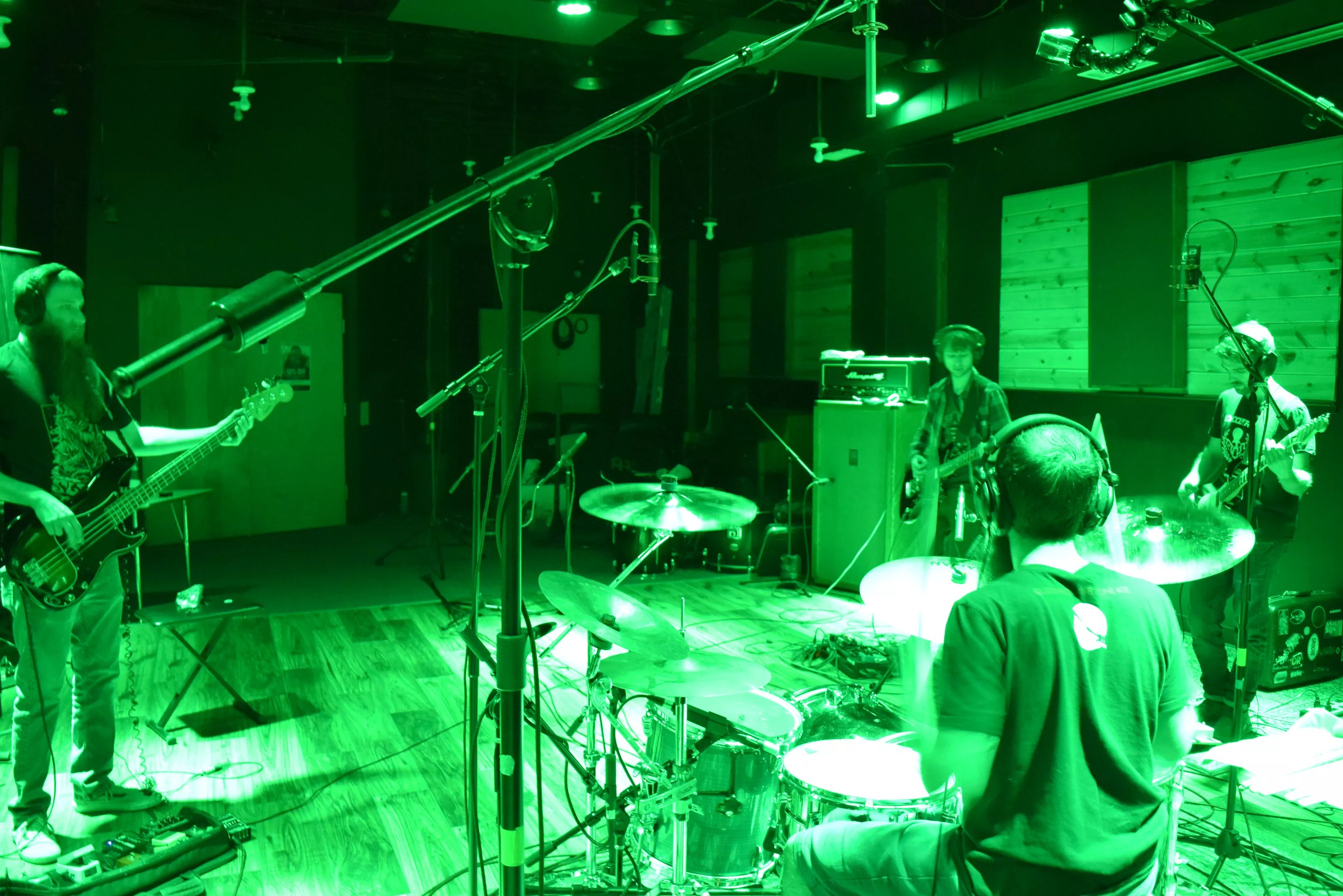
Green Druid’s At the Maw of Death drops December 4.
Green Druid
“We made the best record we could have at this point,” says Green Druid vocalist Chris McLaughlin. “We didn’t compromise on anything.” Recording in the middle of the pandemic was stressful but cathartic, he adds: “We were given a space to let frustration and anger go.”
At the Maw of Ruin is inspired more by cosmic horror and stark Colorado landscapes than contemporary politics, McLaughlin says: “The mountains have this inherent loneliness and majesty to them.”
Despite being apocalyptic for the music industry, this year has been rich with new releases from globally celebrated Denver metal giants such as Primitive Man and Khemmis, and Colorado’s metal community continues to earn its reputation as a hotbed of heavy music.
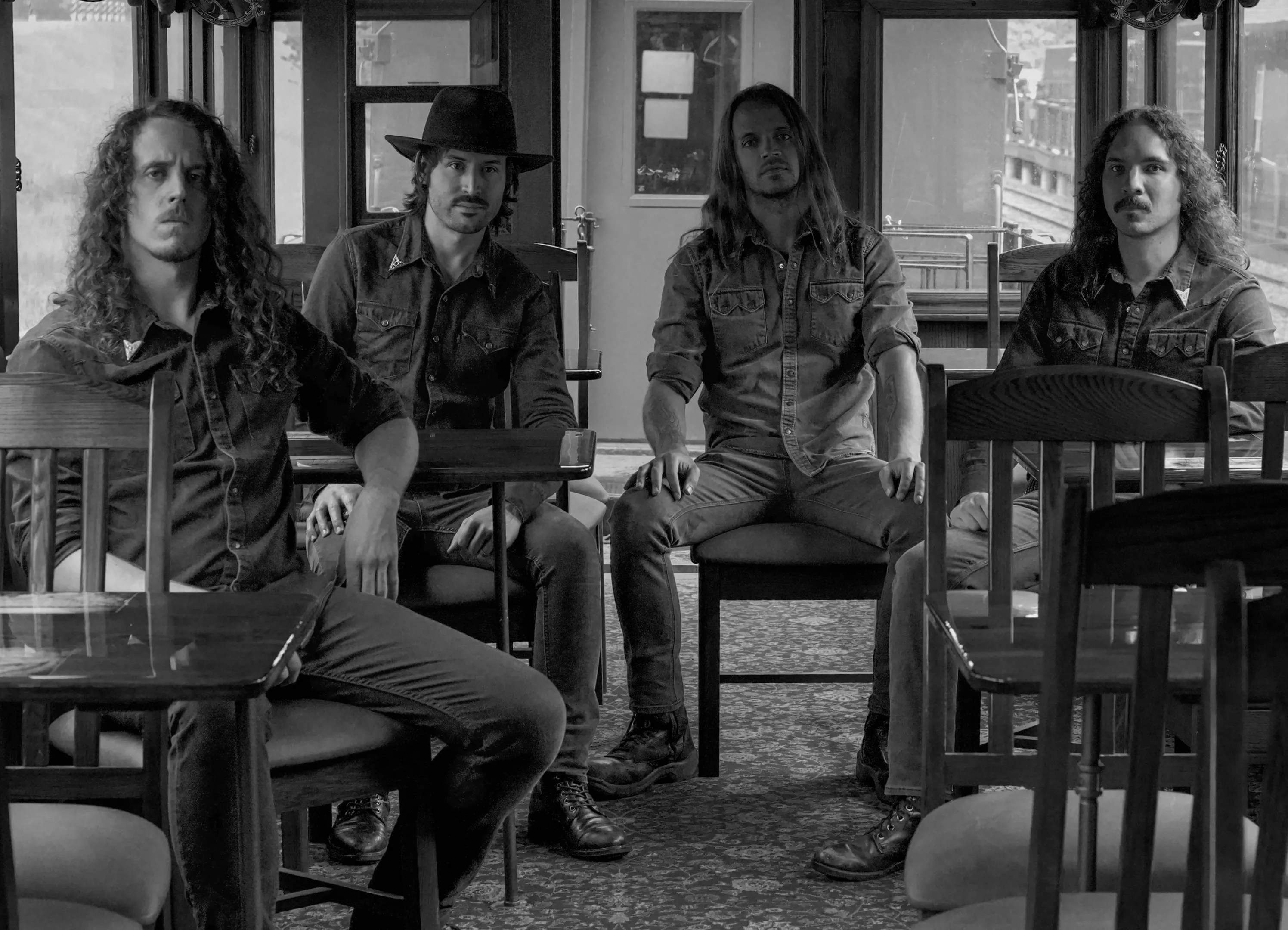
Wayfarer’s new album, A Romance With Violence, takes on the lore of the West.
Elizabeth Marsh
“Some of my friends in other parts of the country ask me, ‘Is there something in the water in Denver?,'” says Isaac Faulk, drummer for Blood Incantation and Wayfarer.
As Green Druid’s Graham Zander tells it, “We owe a lot of our success to our predecessors. Being able to watch really fuckin’ talented bands like In the Company of Serpents or Primitive Man – seeing that this is how you do it, this is how you make really great music – we learned a lot from those bands.”
Groups in Denver’s metal scene are supportive and contribute to each other’s records. At the Maw of Ruin includes an appearance from Grant Netzorg, the creative force behind In the Company of Serpents, which dropped an album, Lux, earlier this year. In turn, Lux includes a guest spot from Primitive Man’s Ethan Lee McCarthy. The connections go on and on, and older bands lend their know-how and platforms to up-and-comers.
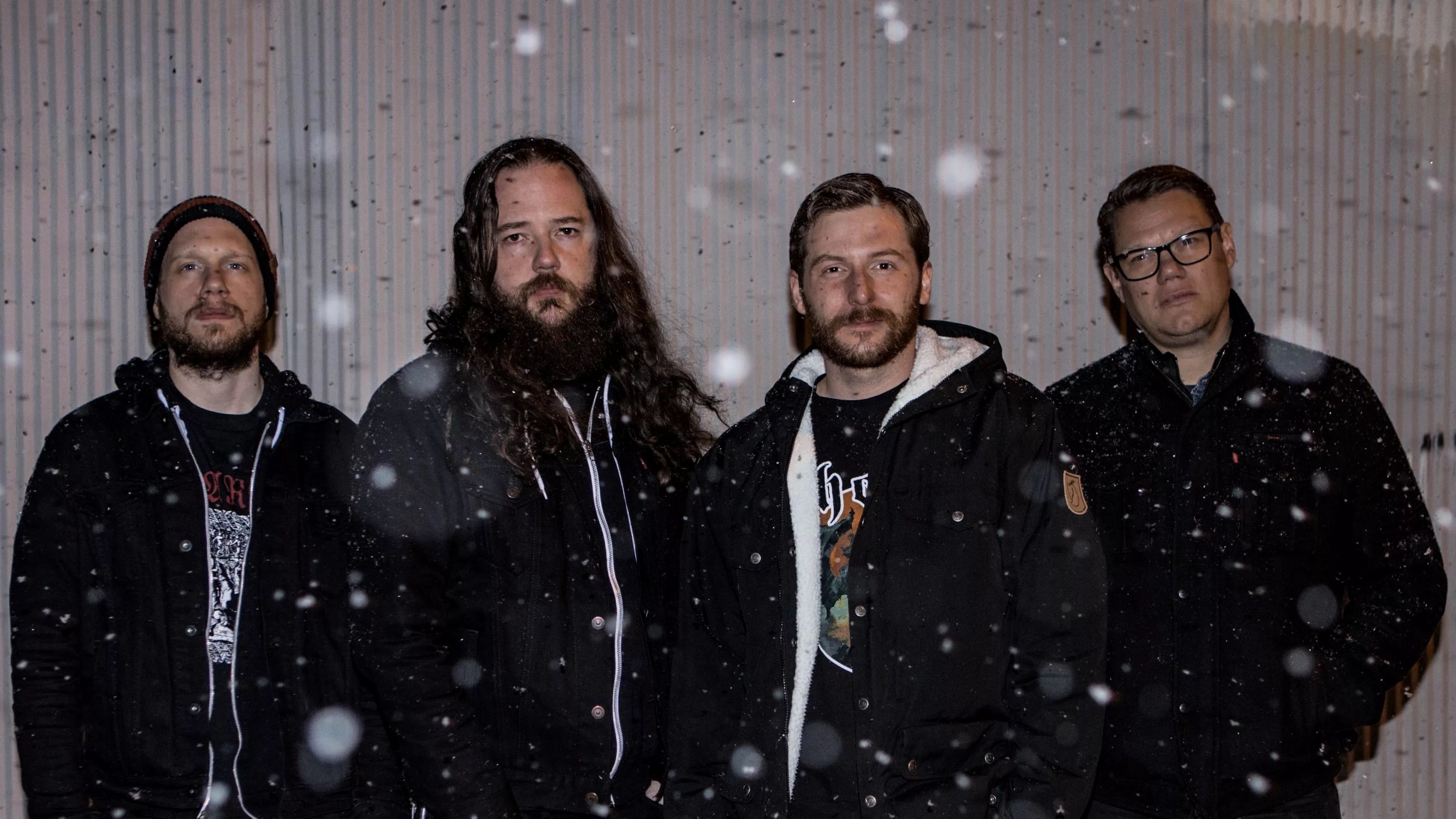
Khemmis has toured the world.
Alvino Salcedo
“There’s a long lineage of the established elders not trying to hoard the success,” says Khemmis and Glacial Tomb guitarist Ben Hutcherson. A doctoral candidate at CU Boulder, Hutcherson is writing his dissertation on Denver’s metal scene while working on the next Khemmis record.
Part of what makes the city’s scene stand out is that “there hasn’t been a legacy of infighting or jealousy,” Hutcherson says. After moving here from Mississippi in 2012, he was surprised by how welcoming the community felt, both as a new fan and a new musician.
He describes McCarthy, 36, as “the godfather of the scene,” and he’s not alone in feeling that way.
“I’m wearing a Primitive Man shirt right now,” says Zander, after explaining how McCarthy “ushered in a new wave of metal music over the past decade.”
McCarthy cultivated the metal scene by booking bands at the now-defunct DIY space Blast-O-Mat from 2009 to 2012. Faulk met his future Blood Incantation bandmates at one of those shows, and plenty of other bands formed after musicians met there.
At Blast-O-Mat and later at another DIY venue, Aqualung, McCarthy brought heavy bands of all stripes into the same space. “That diversity lends itself to less fatigue,” Faulk explains, noting that it fosters mutual respect among bands and fans of different subgenres.
Back in the early 2010s, when fewer national metal acts were playing in Denver, McCarthy set the stage for a Field of Dreams-esque metal renaissance, says Faulk. “We wanted bands to come here, but they weren’t…so we made them.”

Primitive Man’s Ethan McCarthy, center, is known as the godfather of the Denver metal scene.
Alvino Salcedo
“This place was not the thriving metropolitan city that it is now, and was more of a cowtown with little emphasis on the arts,” says McCarthy of the scene two decades ago.
“We decided to forge our own identity in those early days,” adds Netzorg. “The scene has thrived because nobody is trying to ape each other’s sound.”
Hutcherson suggests that Denver became a Petri dish of musical experimentation, with an unspoken pact among bands agreeing to “get weird with it.”
“There are a lot of bands really going for it, but it doesn’t feel like a competition,” says McLaughlin. “There’s not a bad band in the scene.”
Superstar producers Dave Otero and Pete deBoer, of Flatline Audio and World Famous Studios, respectively, have produced much of the metal that has come out of Denver. This year, Otero produced the Green Druid, In the Company of Serpents and Khemmis records, while deBoer recorded Blood Incantation, Wayfarer and more.
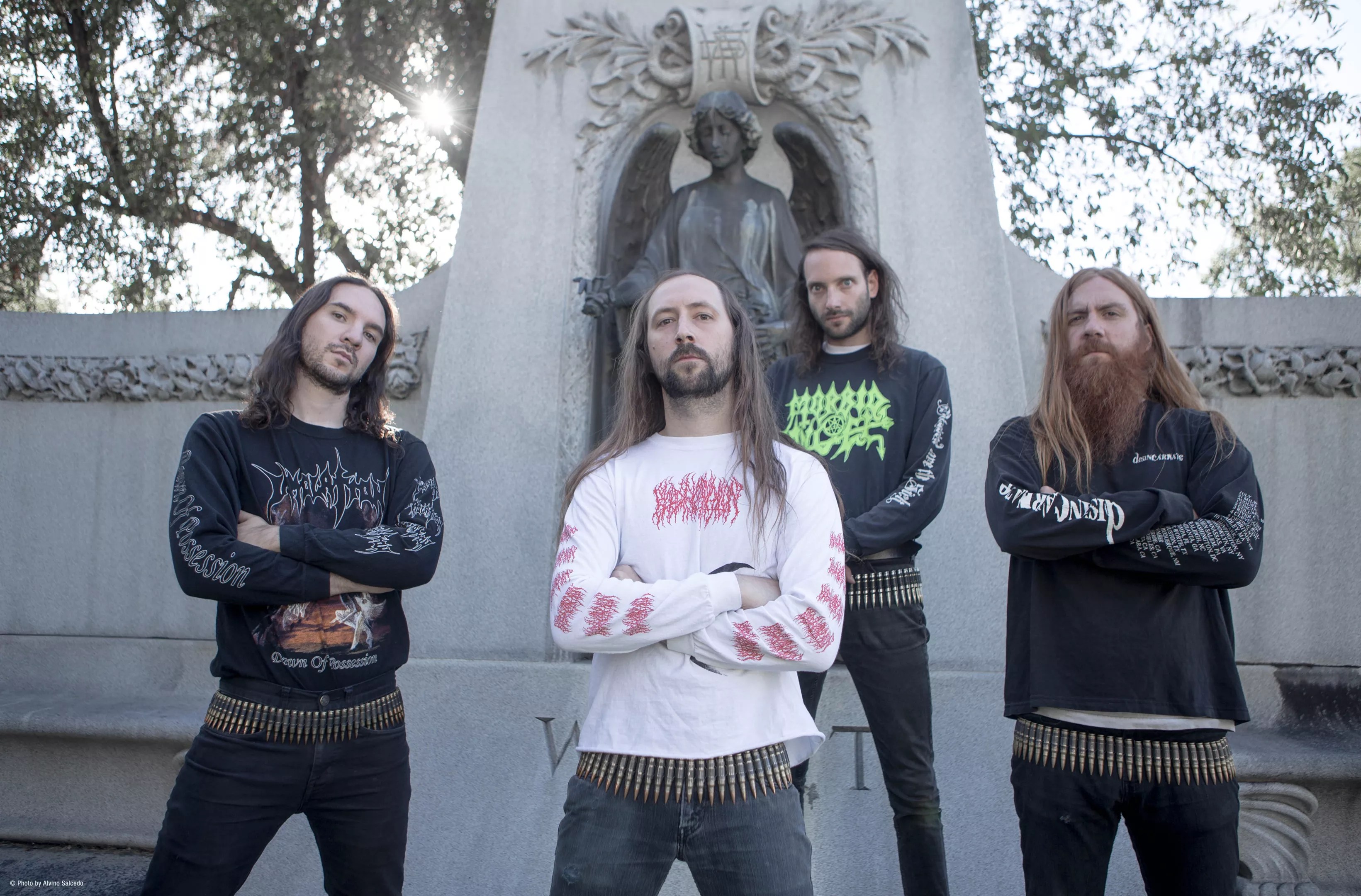
Blood Incantation’s 2019 album Hidden History of the Human Race is a masterful mix of death metal and progressive weirdness.
Alvino Salcedo
Otero played a pivotal role in catapulting Denver’s metal scene to the national stage. In the early 2000s, he recorded some of the earliest albums by one of Denver’s first major breakout bands, Cephalic Carnage. He was a teenager at the time, recording in his mom’s basement. Despite his oversized role in the scene, he says, “I’m just the dude in the middle of a bunch of long-haired shredders and patch vest dudes.”
Many small venues in Denver, particularly along South Broadway, have also been willing to take a chance on lesser-known bands. One of those clubs was 3 Kings Tavern, which McLaughlin describes as the local metal scene’s mecca.
“It was my introduction into the genre,” he says, adding that it’s where Green Druid “grew up as a band,” playing pivotal sets sometimes three times a week to hone its sound.
Hutcherson points to the hi-dive – which booked Khemmis in its early days as an opener for international doom legends Church of Misery – as a critical spot. The Denver band paid it forward, having Green Druid open for a series of sold-out Khemmis shows at the Larimer Lounge.
The DIY community continues to thrive, as well. Seventh Circle Music Collective, in the old Blast-O-Mat space, brings in an even wider variety of genres than its predecessor, including heavy acts. Glitter City, both a recording studio and a DIY venue, also continues to book smaller bands looking to develop their sound.
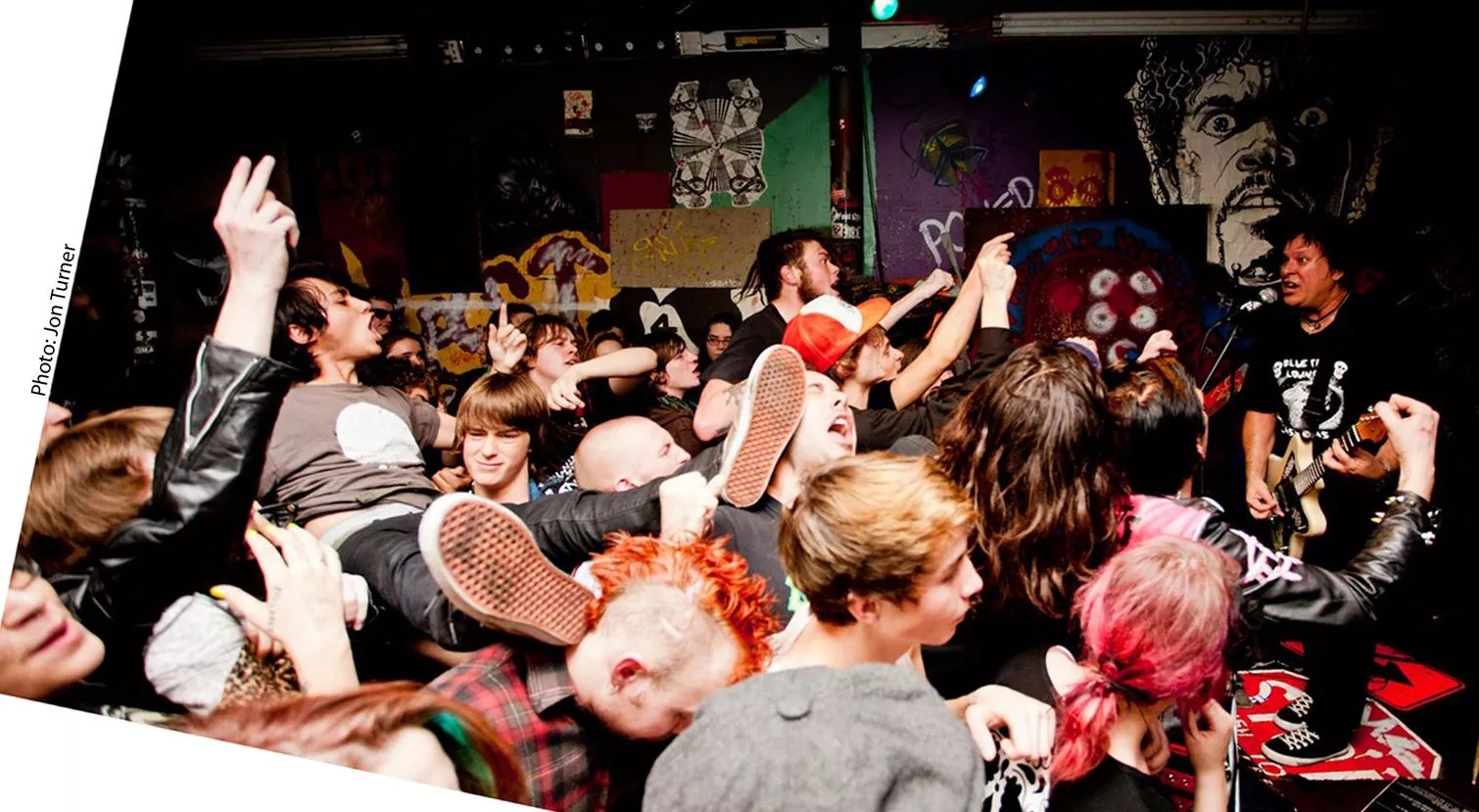
The DIY space Seventh Circle Music Collective was once dubbed Blast-O-Mat.
Jon Turner
“It’s good to have bands at all levels,” says Shaun Goodwin, member of the Munsens and organizer of the annual metal showcase Electric Funeral Fest, which has taken 2020 off. Goodwin says he misses how the festival, which formed after Denver Doom Fest shut down in 2012, brought the city and scene together, and he’s concerned that with 3 Kings Tavern permanently closed and other independent venues on the brink of shuttering, the metal scene will take a massive hit.
Oscar Ross, the head of local hardcore label Sailor Records, says he’s trying to stay optimistic about the future of metal in town.
“It’s been a big year for bands writing,” he says. While there have been more releases than normal in 2020, he expects 2021 will be even bigger.
Ross has released records from staples like Dreadnought, the Munsens and many more. He expects that the pandemic and the political climate are going to produce stronger work from everyone on his label. Anger often fuels metal, and between police killings, a pandemic, a rise of white supremacy and deep political discord, “this year has just pissed everyone off.”
And Colorado continues to be as good a place as any to rage.
“It’s not all weed and sunny days,” says McCarthy. “Elijah McClain’s murder happened here. Lots of seedy shit happens here, but it’s my home, and I still love it.”
Check out At the Maw of Death at the Green Druid Bandcamp page.